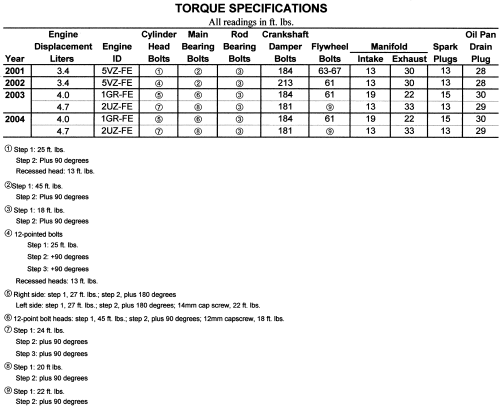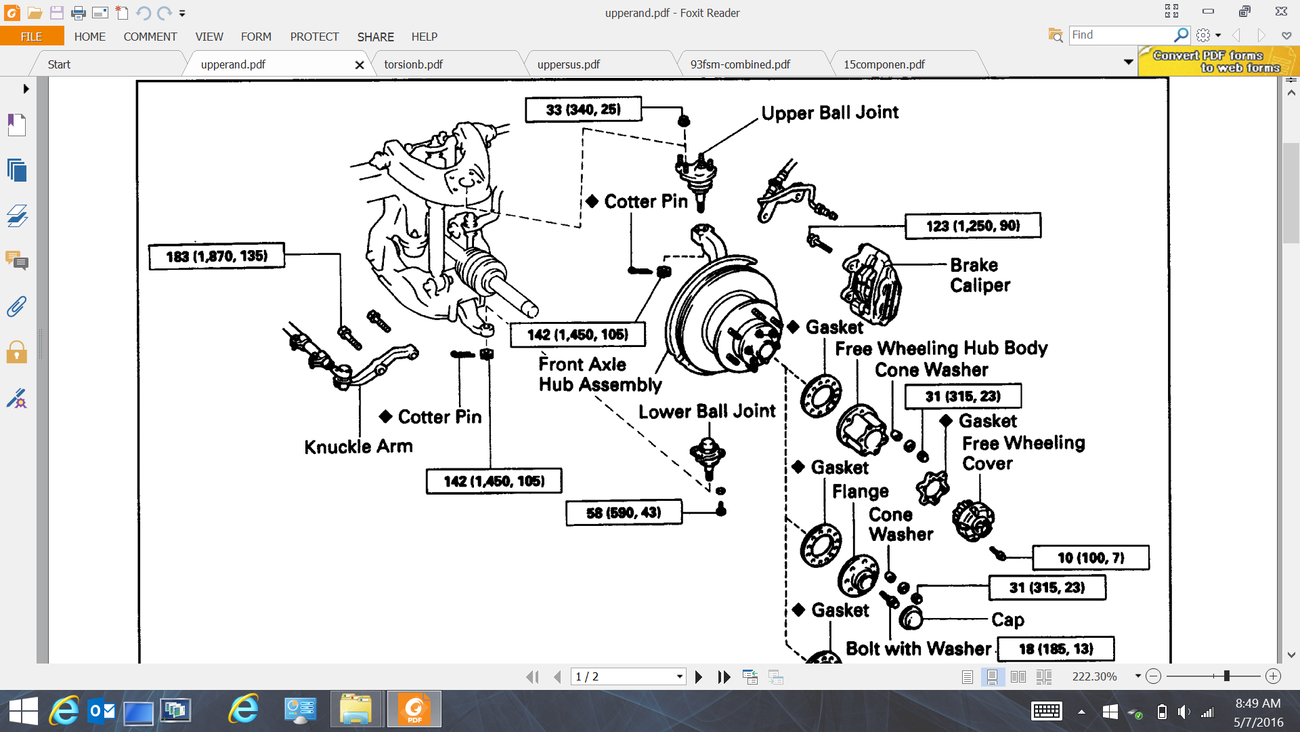The Crucial Role of Wheel Torque in Toyota 4Runner Maintenance
Related Articles: The Crucial Role of Wheel Torque in Toyota 4Runner Maintenance
Introduction
With enthusiasm, let’s navigate through the intriguing topic related to The Crucial Role of Wheel Torque in Toyota 4Runner Maintenance. Let’s weave interesting information and offer fresh perspectives to the readers.
Table of Content
The Crucial Role of Wheel Torque in Toyota 4Runner Maintenance

The Toyota 4Runner, a rugged and reliable SUV, demands meticulous attention to detail when it comes to maintenance. Among the various aspects of upkeep, wheel torque plays a vital role in ensuring the safe and efficient operation of the vehicle. Understanding the significance of wheel torque and the proper procedures for its application is essential for every 4Runner owner.
Understanding Wheel Torque: A Foundation for Safe Driving
Wheel torque, measured in foot-pounds (ft-lb), refers to the rotational force applied to the lug nuts that secure the wheels to the vehicle’s axles. This force ensures that the wheels remain firmly attached, preventing them from loosening and potentially detaching during driving.
The Importance of Proper Wheel Torque
Maintaining the correct wheel torque is crucial for several reasons:
- Safety: Inadequate torque can lead to loose wheel nuts, which could cause the wheel to detach while driving, resulting in a catastrophic accident.
- Performance: Incorrect torque can affect the vehicle’s handling and braking performance. Loose wheels can lead to vibrations, uneven tire wear, and reduced braking efficiency.
- Tire Life: Proper torque ensures that the wheel is securely mounted, preventing premature tire wear due to uneven pressure distribution.
- Suspension Components: Consistent torque prevents excessive stress on the suspension components, extending their lifespan.
Factors Influencing Wheel Torque
Several factors influence the recommended wheel torque for a Toyota 4Runner:
- Year of Manufacture: Different model years may have variations in wheel design and lug nut specifications, requiring different torque values.
- Wheel Size and Type: Larger wheels and those made of different materials (e.g., aluminum) may require different torque settings.
- Lug Nut Material: Steel and aluminum lug nuts have different tightening characteristics, necessitating specific torque values.
- Tire Pressure: While not a direct factor in torque, tire pressure can affect the overall load on the wheel, indirectly influencing the required torque.
Finding the Correct Wheel Torque for Your Toyota 4Runner
To ensure accurate wheel torque, consult the following resources:
- Owner’s Manual: The Toyota 4Runner owner’s manual provides the recommended torque specifications for your specific vehicle year and model.
- Service Manual: A detailed service manual for your Toyota 4Runner will contain comprehensive information on torque values for various components, including wheel nuts.
- Toyota Website: The official Toyota website may provide torque specifications for your vehicle model.
- Reputable Automotive Websites: Online resources like RepairPal or Alldata offer torque specifications for a wide range of vehicles.
Proper Wheel Torque Application Techniques
- Cleanliness: Before tightening the lug nuts, ensure that the wheel hub and lug nut threads are clean and free of debris.
- Torque Wrench: Use a calibrated torque wrench to ensure accurate tightening. Torque wrenches are specifically designed to apply a precise amount of force.
- Tightening Sequence: Follow the recommended tightening pattern for your vehicle. This pattern ensures even pressure distribution across all lug nuts.
- Final Tightening: After reaching the recommended torque value, give the lug nuts a final, slight tightening to ensure they are securely seated.
FAQs on Toyota 4Runner Wheel Torque
Q: How often should I check and adjust wheel torque?
A: It is recommended to check and adjust wheel torque after every tire rotation, especially after tire changes or wheel repairs. Additionally, check the torque after long drives, particularly those involving heavy loads or rough terrain.
Q: Can I use a regular wrench to tighten the lug nuts?
A: While you can use a regular wrench to tighten the lug nuts, it is highly recommended to use a torque wrench for accurate torque application.
Q: What happens if I overtighten the lug nuts?
A: Overtightening the lug nuts can damage the wheel studs, leading to premature failure. It can also cause stress on the wheel bearings and suspension components.
Q: What if I cannot find the recommended torque value for my vehicle?
A: If you cannot find the recommended torque value for your specific vehicle, consult a qualified mechanic or Toyota dealership for guidance.
Tips for Maintaining Optimal Wheel Torque
- Regularly check and adjust wheel torque: This is a simple yet crucial maintenance practice that can prevent major issues.
- Use a high-quality torque wrench: Ensure that your torque wrench is properly calibrated and in good working order.
- Follow the recommended tightening sequence: This ensures even pressure distribution across all lug nuts.
- Avoid using impact wrenches: While convenient, impact wrenches can overtighten lug nuts, leading to damage.
Conclusion
Proper wheel torque is an essential aspect of Toyota 4Runner maintenance, contributing to the vehicle’s safety, performance, and longevity. By understanding the importance of wheel torque, following the recommended procedures for its application, and adhering to regular checks, 4Runner owners can ensure their vehicle remains reliable and roadworthy for years to come.



![]()

![]()

Closure
Thus, we hope this article has provided valuable insights into The Crucial Role of Wheel Torque in Toyota 4Runner Maintenance. We hope you find this article informative and beneficial. See you in our next article!